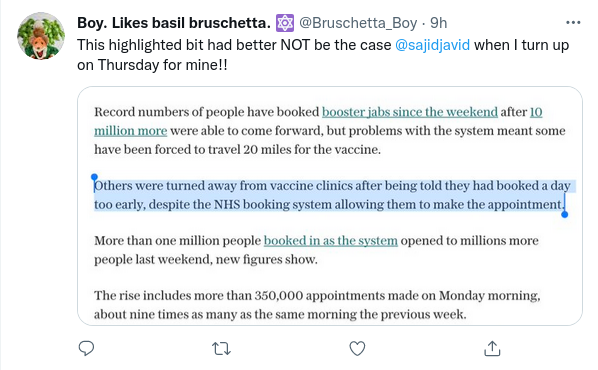If there is one thing that the British public sector is good at then it’s specifying, contracting for and installing piss poor IT systems. Britain used to be the workshop of the world during the Industrial Revolution but today it is the land where the ‘broken computer system says no’. Sadly this is not just a recent problem or one that only crops up now and again, it seems to be a consistent and regular occurrence going back years.
Two historical examples spring to mind here. The first one is this: I once worked for a short while in a public sector body that had a large number of public enquiries made to it. All these enquiries had to be logged onto a clunky but expensive computer system. The system was so unwieldy and clunky that it took more time and took more steps to enter the data than it did to deal with the enquiry. Also due to the nature of the system and the need to use other applications during the call, the data could not be entered into the system live. The only way around this was to note the enquiries on bits of paper and then spend time ignoring customers whilst the paper based data was entered into the system. The second historical example is the infamous NHS data management system that was finally abandoned in 2008 at a cost of nearly ten billion pounds. Poor specification requirements given by the NHS to contractors along with changes to specifications ensured that the much vaunted and expensive patient record system just didn’t properly work. As of 2013 the legal and contractual fall out from the 2008 abandonment of the NHS patient record system was still going on.
Unfortunately the state of public sector IT systems has not got better since then. Recently my wife and I went to a local library to renew a book that our son had had out on loan. Now renewing a book or a DVD should be a relatively simple matter whether the library system is digitised or whether it runs on the old style manual card system. Not so in Britain it seems. The Library IT system is on a central timer that shuts the library computer system down five minutes before the library is due to close.
This means that not only that a last minute customer cannot be entered into the system, the system is also not available to library staff for after hours stuff like stock management or cataloguing or any other similar task. There is no override for this timed lock of the library management system and none of the staff that are in the library can log in to amend records or manage stock or renew a borrowed item. The IT system shuts off ALL the library management computers centrally and there’s nothing that the local library staff can do to stop it.
I can’t for the life of me see any reasoning for this system being run like this. If the designers were trying to prevent a rogue librarian logging in at midnight and trashing the records then there are other ways to prevent this happening and in any event any such access to the system would be logged and any damage restored from back up, presuming that the system has a back up that is. But such an occurrence represents a very tiny chance of a problem and not one that justifies shutting down the entire library computer system five minutes before closing. It made me wonder what happens when the library opens? Are the doors opened and are customers allowed to build up at the check out desk to wait until the computer system comes online? Sounds very much like that could be the case.
However if the badly designed library computer system is a bit of an annoyance, the latest public sector IT failure is much more serious. According to a normally reliable Twitter account ‘Boy Likes Basil Bruschetta’, similar serious failures are cropping up in the Government’s Covid vaccine booster vaccine booking system. He’s found a source that is alleging that people are being allowed by the NHS computer system to book vaccine clinic dates and places that are not available in real life. This has led to people having to make excessively long journeys to get their vaccination and has even led to people turning up at clinics on dates where the vaccine is not available.
Here’s the claim:
This is an appalling cock up by the NHS and by the Government. This is the sort of problem that should have been identified in testing and not only come to light when the system went live. People are taking time off work and making sometimes expensive child care arrangements so that they can get their booster covid vaccines yet the NHS IT system is sending them to far off places to be vaccinated and even giving them appointment dates that do not exist.
I cannot for the life of me understand how these sort of cock ups are happening? After all there is a wealth of experience from the first vaccine roll out in managing hundreds of thousands of bookings which should mean that problems like these should not have occurred.
Both the retail and the banking sector seem to be able to create IT systems that are not only secure but also have no significant downtime. Yes these systems have occasional problems but nothing like the problems that occur in Britain with IT systems in the public sector. For example I was able to order a five litre can of disinfectant from Screwfix the other day and know that I would be able to pick it up the following day because the company’s website told me that it would be delivered to the local branch the next morning. Why can’t the public sector IT systems and delivery systems be that efficient? Britain seems to have an awful lot of failed and failing IT systems and nobody seems to be learning any lessons about why and how they fail in order to prevent such problems happening in the future.







Personally, I am delighted that the government, councils, most of the public sector etc. are incapable of installing a decent integrated IT system. It delays the day of total State surveillance. However there is ONE area where the State excels in its IT systems, and that is the issuing of fines, penalties, tax demands, motoring fines, parking tickets, congestion charges and low emission zone fines.
It seems that fleecing the public is a far higher priority than serving the public, as the first rakes in the cash, the second doles it out.
I suspect this is not mere coincidence as State bodies are seemingly more concerned with self-perpetuation than serving the public who are mugged, on pain of yet more automated fines, rarely able to deal with a human, to pay for this cyber-Mafiosi.
My vain hope is that the TfL monstrosity that has turned London into a tracked cyber-prison, crashes spectacularly and fatally.
THE NHS system is unfit for purpose, plus our data seems to be available to all and sundry, except us, while the police are using their more and more to suck in the innocent than deal with real crime. Worse is how “terrorism” is the excuse for every encroachment and abuse of our freedoms. We have opted out of every system we can.
The Covid, track, trace and punish total surveillance disguised as public health is an intrusive, error-ridden disgrace, just wait until the climate crap kicks in to further restrict us.
So, on balance, I want it to keep failing, hang the cost, because the longer it fails, the later the spectre of the UK as an offshore prison colony, descends.
Yes I’ve noticed how the State is very very good at producing IT systems for gathering money but less successful in producing IT that provides better services to the customers of state enterprises such as the NHS.